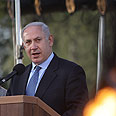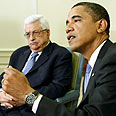

In his recent meeting with President Obama, Prime Minister Benjamin Netanyahu declared his intention to immediately resume the peace process with the Palestinians. The extent of Netanyahu’s actual commitment to resolving the Israeli-Palestinian conflict will soon become apparent.
What can be said in his favor is that, unlike his predecessor, former Prime Minister Ehud Olmert, Netanyahu is in a relatively strong position to conclude a peace deal with the Palestinians, both because it is easier for a hawk to sell an agreement to a wary public than it is for a dove, and also because of a constellation of regional and international events that bode well for progress in peacemaking: the desire to unite moderate forces in the region against Iranian belligerence, the renewed effort of Arab leaders to garner support for the Arab Peace Initiative, a West Bank leadership committed to living side-by-side with Israel, a dramatic security improvement in the West Bank, and the emergence of an American president with the legitimacy, the credibility, and the political support – domestically and internationally – to push for an agreement during his first term in office.
To succeed, however, Netanyahu will need to take a number of steps he will find difficult but which are necessary for progress with the Palestinians.
First, the Israeli premier ought to publicly endorse an independent Palestinian state, without further delay. His talk of an “economic peace” and Palestinian autonomy is a sure-fire recipe for diplomatic stalemate and continued violence. Without a clear political future, the Palestinian leadership lacks the incentive it needs to make progress on the peace process. Furthermore, most experts agree that, with Islamist extremists gaining ground and both Palestinians and Israelis losing faith in peace, time is running out for a two-state solution to the conflict – the key to ensuring that Israel remains both a democratic and a Jewish state.
Second, he should begin removing the roadblocks and reopening more West Bank roads to facilitate free movement throughout the West Bank. In the last year, there has been a significant improvement in security throughout the West Bank, due largely to the work of US General Keith Dayton, who has led a successful training program of the Palestinian National Security Forces. Netanyahu can capitalize on this success by helping to facilitate free movement in areas that the Israeli security establishment concludes are secure.
Lift Gaza blockade
Third, Israel must lift the Gaza blockade and allow for humanitarian aid and assistance to be delivered to the residents of Gaza. The Israeli embargo has led to a humanitarian catastrophe and, in turn, widespread international condemnation of Israel. Ending the embargo does not mean endorsing or even legitimatizing Hamas’ rule in Gaza. On the contrary, an improvement in the living conditions of Gazans will undermine Hamas’ propaganda.
Finally, Netanyahu must not only remove the 22 illegal outposts in the West Bank, as he has begun to do, but he must also freeze all new settlement construction including housing aimed to accommodate “natural growth.” Settlement activity is incompatible with progress in the peace process and is, perhaps, the single greatest obstacle to a two-state solution to the conflict.
Moreover, it threatens to put the Netanyahu government on a collision course with the Obama administration. As Welfare Minister Isaac Herzog recently said, “in Washington, just like in many other capitals around the world, there is a sense that Israel did not live up to its obligations and bluffed on the settlement issue.”
The Obama administration’s position on settlements is similar to the position of previous administrations. The difference, however, is that Obama – unlike George Bush or Bill Clinton – does not plan to look the other way as a new settlement is erected or an existing one is expanded. If Netanyahu wants to avoid a clash with the new occupant of the White House, he will need to forgo playing games on this issue and freeze all settlement activity.
Progress in peacemaking will surely not depend on Israel’s actions alone. However, if Netanyahu decides to display bold leadership on the Israeli-Palestinian issue, the vision of a two-state solution to the conflict may finally be realized.
Dr. Guy Ziv is Visiting Professor of International Relations at St. Mary’s College of Maryland. This summer, he will be teaching a course on Israeli security and foreign policy at the University of Maryland















